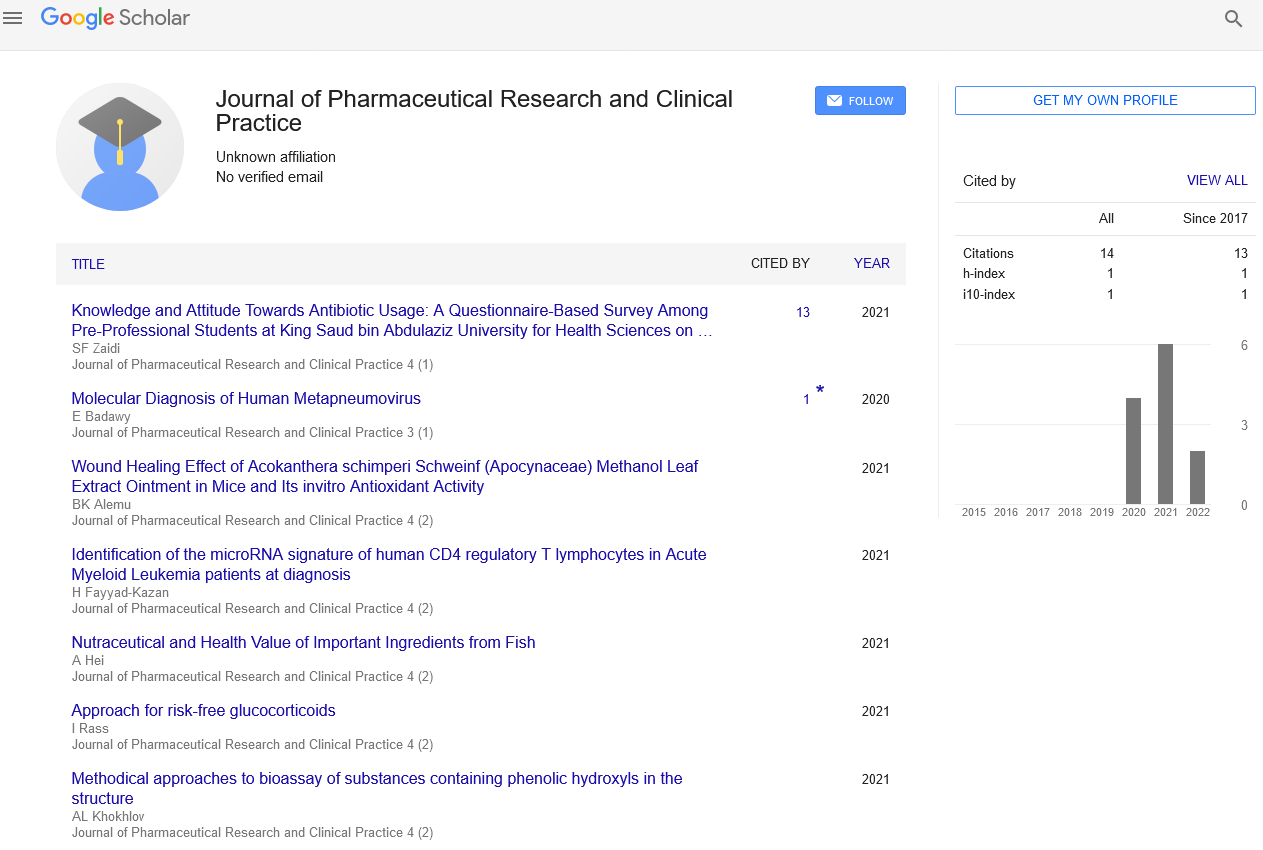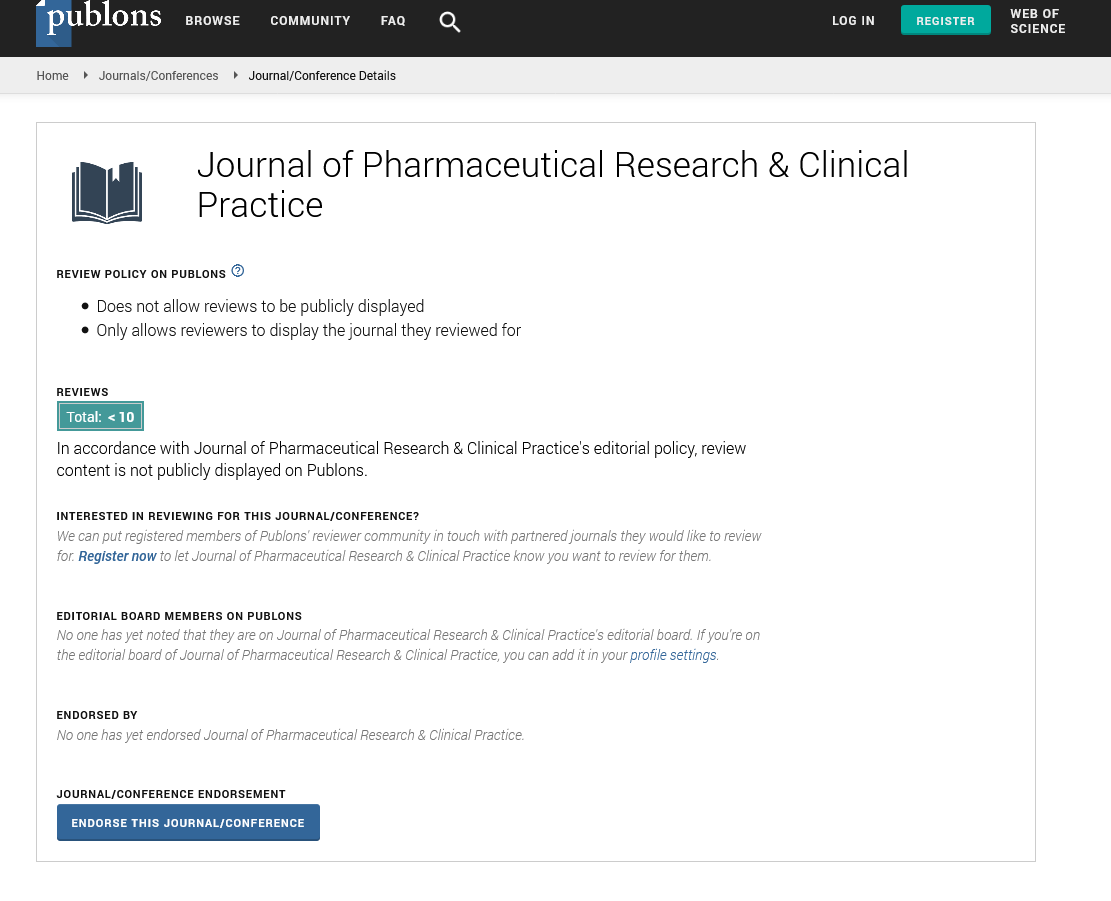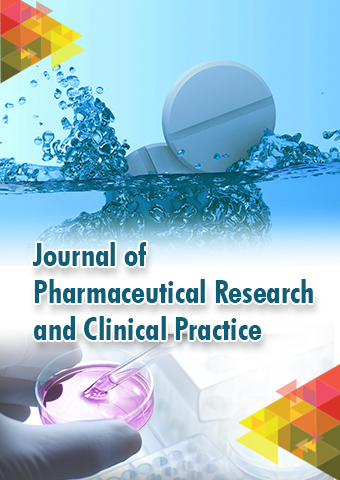Short Communication - Journal of Pharmaceutical Research and Clinical Practice (2023) Volume 6, Issue 3
Navigating the Ethical Landscape of Medicine: Balancing Care and Responsibility
Bhutada Richard*
Department of Clinical Practice, Australia
Department of Clinical Practice, Australia
E-mail: richard_bda@gmail.com
Received: 02-June-2023, Manuscript No. jprcp-23-103121; Editor assigned: 05-Jun-2023, PreQC No. jprcp-23- 103121(PQ); Reviewed: 19-Jun- 2023, QC No. jprcp-23-103121; Revised: 23-Jun-2023, Manuscript No. jprcp-23-103121 (R); Published: 30-Jun-2023; DOI: 10.37532/ jprcp.2023.6(3).54-57
Abstract
Medical ethics serves as a moral compass in the field of healthcare, guiding the decisions made by medical professionals and ensuring the well-being and dignity of patients. This article explores the importance of medical ethics, highlights key ethical principles, and discusses complex ethical dilemmas faced by healthcare providers today. The foundations of Medical Ethics, Including Autonomy, Beneficence, Non-Maleficence, Justice, And Confidentiality, Form The Basis Of Ethical Decision-Making. The article addresses significant ethical challenges such as end-of-life care, resource allocation, genetic testing and engineering, informed consent, and emerging technologies. Strategies for promoting ethical practice, including education and training, ethical committees and consultations, patient-centered care, ethical guidelines and policies, and reflective practice, are also discussed. By embracing ethical principles and engaging in continuous learning, healthcare professionals can navigate the ethical landscape of medicine, striking a balance between care and responsibility in the pursuit of optimal patient outcomes.
Keywords
Medical ethics • Ethical principles • Healthcare • Decision-making • Autonomy
Introduction
The practice of medicine is not solely confined to the realm of scientific knowledge and technical expertise; it also encompasses a profound moral dimension [1]. Within the field of healthcare, medical professionals are confronted with complex decisions that demand a delicate balance between providing care and upholding a sense of ethical responsibility. Navigating the ethical landscape of medicine requires an understanding of fundamental principles, recognition of the evolving challenges posed by modern advancements, and a commitment to ensuring the well-being and dignity of patients [2]. Medical ethics serves as the compass that guides healthcare providers through the intricate web of moral considerations. It encompasses a framework of values and principles that shape decision-making, ethical dilemmas, and the delivery of healthcare services. These principles, including autonomy, beneficence, non-maleficence, justice, and confidentiality, form the cornerstone of medical ethics and provide a solid foundation for ethical decision-making [3]. Autonomy recognizes the inherent right of patients to make informed decisions about their own healthcare, free from external coercion or undue influence. It acknowledges the importance of respecting individual choices, values, and preferences. Beneficence emphasizes the ethical imperative to act in the best interest of the patient, seeking to promote their well-being and health outcomes [4]. Non-maleficence, on the other hand, emphasizes the duty to do no harm, urging healthcare professionals to minimize risks and avoid unnecessary harm to patients. Justice, a crucial principle in medical ethics, calls for fairness and equality in the distribution of healthcare resources. It involves considering the needs of both individuals and communities, ensuring that all individuals have access to appropriate and timely care regardless of socioeconomic status or other discriminatory factors [5]. Confidentiality, the final principle, underlines the importance of safeguarding patient information and maintaining their privacy. It fosters trust and open communication between patients and healthcare providers. However, the ethical landscape of medicine is not static [6]. Advancements in medical technology, breakthroughs in genetic research, and shifting societal values constantly introduce new challenges that necessitate ethical deliberation. Healthcare providers are confronted with complex ethical dilemmas in areas such as end-of-life care, resource allocation, genetic testing and engineering, informed consent, and the ethical implications of emerging technologies [7]. These dilemmas often require careful consideration of competing values and moral obligations, with no easy or definitive answers. In this article, we delve into the intricacies of medical ethics, exploring its importance and the core principles that guide ethical decision-making [8]. We examine the ethical dilemmas faced by healthcare providers today, acknowledging the nuanced considerations that arise in the context of end-of-life care, resource allocation, genetic advancements, informed consent, and emerging technologies [9]. Furthermore, we discuss strategies for promoting ethical practice, including education and training, ethical committees and consultations, patient-centered care, ethical guidelines and policies, and reflective practice. By navigating the ethical landscape of medicine with care and responsibility, healthcare professionals can uphold the values of medical ethics, foster trust with patients, and strive for optimal patient outcomes [10]. Balancing the provision of quality care with ethical considerations is an ongoing challenge that demands a commitment to ethical reflection, open dialogue, and a deep understanding of the moral dimensions inherent to the practice of medicine.
Material and Method
The foundations of medical ethics
Medical ethics is rooted in several core principles that form the foundation of ethical decisionmaking in healthcare. These principles include:
Autonomy: Respecting an individual’s right to make informed decisions about their own healthcare, free from coercion or manipulation. Beneficence: Acting in the best interest of the patient and seeking to promote their well-being and health outcomes.
Non-maleficence: Avoiding harm to patients and minimizing potential risks associated with medical interventions.
Justice: Ensuring fairness and equality in the distribution of healthcare resources, while considering the needs of individuals and communities.
Confidentiality: Safeguarding patient information and maintaining their privacy, fostering trust and open communication.
Beneficence: Acting in the best interest of the patient and seeking to promote their well-being and health outcomes.
Ethical dilemmas in modern medicine
Advancements in medical technology, breakthroughs in genetic research, and evolving societal values have introduced a range of ethical dilemmas in healthcare. Some of the prominent issues include:
End-of-life care: Determining appropriate interventions and decision-making for patients nearing the end of their lives, such as the use of life-sustaining treatments, palliative care, and euthanasia.
Resource allocation: Addressing the scarcity of healthcare resources, such as organs for transplantation or access to expensive treatments, and deciding how to prioritize distribution in a fair and equitable manner.
Genetic testing and engineering: Balancing the potential benefits and risks of genetic testing, gene editing technologies, and reproductive choices, considering implications for individual autonomy and the well-being of future generations.
Informed consent: Ensuring patients have comprehensive information about the risks, benefits, and alternatives of medical procedures, enabling them to make autonomous decisions.
Emerging technologies: Evaluating the ethical implications of emerging technologies, such as artificial intelligence, telemedicine, and the use of big data, including issues of privacy, bias, and equitable access.
Promoting ethical practice
To promote ethical practice, healthcare professionals must be guided by a commitment to integrity, empathy, and continuous learning. Several strategies can help navigate ethical challenges effectively:
Education and training: Incorporating ethics education into medical training programs, equipping healthcare providers with the knowledge and skills to address ethical dilemmas.
Ethical committees and consultations:Establishing institutional ethics committees and encouraging open discussions among healthcare professionals to seek guidance and resolve complex ethical dilemmas collaboratively.
Patient-centered care: Emphasizing shared decision-making and open communication with patients, ensuring their values, preferences, and concerns are respected.
Ethical guidelines and policies: Developing and adhering to clear ethical guidelines and policies at both institutional and national levels, providing a framework for ethical decisionmaking.
Reflective practice: Encouraging healthcare professionals to engage in self-reflection and critical analysis of their own ethical decisionmaking processes, promoting personal and professional growth. Medical ethics plays a crucial role in guiding healthcare providers through the complex moral landscape of medicine. By embracing ethical principles and recognizing the challenges posed by emerging technologies and shifting societal norms, healthcare professionals can uphold the values of autonomy, beneficence, non-maleficence, justice, and confidentiality. Through ongoing education, collaborative discussions, and patient-centered care, we can strive for a healthcare system that not only achieves medical excellence but also respects the dignity and well-being of all individuals.
Discussion
Medical ethics plays a fundamental role in shaping the delivery of healthcare and guiding the decisions made by medical professionals. In an ever-evolving field, where technological advancements and societal changes introduce new challenges, medical ethics serves as a moral compass to ensure the well-being and dignity of patients are prioritized. This article explores the importance of medical ethics, highlights key ethical principles, and discusses some of the complex ethical dilemmas faced by healthcare providers today. Medical ethics plays a crucial role in guiding healthcare providers through the complex moral landscape of medicine. By embracing ethical principles and recognizing the challenges posed by emerging technologies and shifting societal norms, healthcare professionals can uphold the values of autonomy, beneficence, non-maleficence, justice, and confidentiality. Through ongoing education, collaborative discussions, and patient-centered care, we can strive for a healthcare system that not only achieves medical excellence but also respects the dignity and well-being of all individuals.
Conclusion
Navigating the ethical landscape of medicine requires a delicate balance between providing care and upholding ethical responsibility. Medical ethics serves as a guiding framework, rooted in principles such as autonomy, beneficence, nonmaleficence, justice, and confidentiality. These principles provide a solid foundation for ethical decision-making, ensuring that patient well-being and dignity remain at the forefront of healthcare practice. However, the evolving nature of medicine presents complex ethical dilemmas that demand careful consideration. End-of-life care, resource allocation, genetic testing, informed consent, and emerging technologies are just a few of the ethical challenges faced by healthcare providers today. These dilemmas often require difficult choices and a nuanced understanding of competing values and moral obligations. To promote ethical practice, healthcare professionals must engage in continuous learning, embracing education and training programs that instil ethical values and principles. The establishment of ethical committees and consultations provides a platform for collaborative discussions and guidance in resolving complex ethical dilemmas. Patient-centered care, which emphasizes shared decision-making and open communication, ensures that patient values and preferences are respected throughout the healthcare journey. Adherence to ethical guidelines and policies at both institutional and national levels is crucial for creating a framework that supports ethical decision-making. Reflective practice encourages healthcare professionals to engage in self-reflection and critical analysis of their ethical choices, fostering personal and professional growth. By striking a balance between care and responsibility, healthcare professionals can uphold the values of medical ethics, promote trust, and strive for optimal patient outcomes. Ethical practice in medicine is an ongoing journey that requires a commitment to ethical reflection, open dialogue, and an unwavering dedication to upholding the dignity and well-being of patients. By navigating the ethical landscape of medicine with care and responsibility, healthcare professionals can ensure that the moral dimensions of healthcare practice are upheld, fostering a healthcare system that is not only technically excellent but also ethically grounded and compassionate.
References
- Rubler S, Dlugash J, Yuceoglu YZ et al. New type ofcardiomyopathyassociated with diabetic glomerulosclerosis.Am J Cardiol. 30, 595–602 (1972).
- Aneja A, Tang WH, Bansilal Set al.Diabetic cardiomyopathy: Insights into pathogenesis, diagnostic challenges, and therapeutic options.Am J Med. 121, 748–757(2008).
- Brownlee M.Biochemistry and molecularcell biologyof diabetic complications.Nature. 414, 813–820 (2001).
- Ansley DM, Wang B.Oxidativestressand myocardial injury in the diabetic heart.J Pathol. 229, 232–241(2013).
- Aragno M, Mastrocola R, Alloatti Get al.Oxidativestresstriggers cardiac fibrosis in the heart of diabetic rats.Endocrinology. 149, 380–388 (2008).
- Kaiser.Panel cautiously confirms low dose effects.J Endocrine disruptersScience.290(5492), 695–697 (2000).
- Neubert D.Vulnerability of the endocrine system to xenobiotic influence.Reg Toxicol Pharmacol. 26, 9–29 (1997).
- Ahmed SA, Hissong BD, Verthelyi Det al.Gender and risk of autoimmune diseases: possible role of estrogenic compounds.EnvironHealthPerspect. 5, 681–686 (1999).
- Ashby J.Testing for endocrine disruption post EDSTAC: extrapolation of low dose rodent effects to humans.Toxicol Lett. 120, 233–242 (2001).
- Behzadnia S, Davoudi A, Rezai MSet al.Nosocomial infections in pediatric population and antibiotic resistance of the causative organisms in north of Iran.Iran Red Crescent Med J. 16, 14562 (2014).
Indexed at, Google Scholar, Crossref
Indexed at, Google Scholar, Crossref
Indexed at, Google Scholar, Crossref
Indexed at, Google Scholar, Crossref
Indexed at, Google Scholar, Crossref
Indexed at, Google Scholar, Crossref
Indexed at, Google Scholar, Crossref
Indexed at, Google Scholar, Crossref
Indexed at, Google Scholar, Crossref


